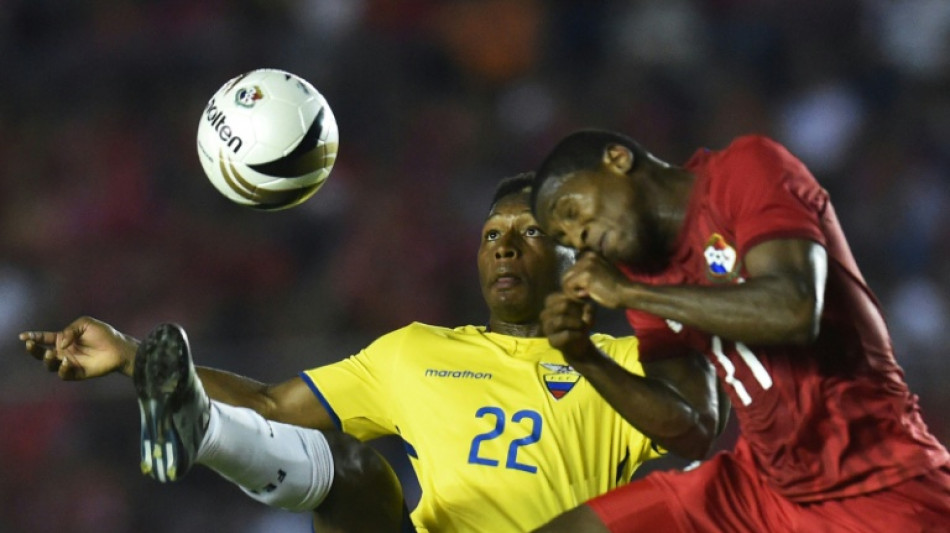
Goals, guns and narcos: Hitmen plague Ecuador's beautiful game

In Ecuador, football is a deadly sport, with players competing in the shadow of match-fixing mafias and under threat of an assassin's bullet.
Midfielder Jonathan Gonzalez, 31, was relaxing at his home near the Colombian border this month when a hitman approached on a motorcycle and shot him in the head.
"Speedy," as he was known to teammates, had played for the Club 22 de Julio, a second division side from Esmeraldas, and was one of three Ecuadoran pros killed in the last month alone.
He was "a good kid who died because of betting," club employee Oswaldo Batallas told AFP.
Gonzalez's death shocked the club and Ecuador, but it was not a total surprise.
Just days before, fellow second division pros Maicol Valencia and Leandro Yepez were gunned down at a hotel on the coast.
Valenica died at the scene, Yepez made it to the hospital, but did not survive. Both played for Exapromo Costa.
Days before his own death, Gonzalez had received chilling warnings of what was to come.
His car was shot up, and his mother received threats.
Then a mafia linked to online betting allegedly pressured him to lose a match -- which ended in a 1–1 draw.
Police are still investigating the deaths of all three men.
Dollarised, beautiful and welcoming to visitors, Ecuador has long been a popular getaway home for mafiosos.
But since the country has become a major transit hub for Colombian cocaine, it has attracted narcos and gangsters in droves.
Competition between local groups affiliated with Mexico's Sinaloa Cartel, Italy's Andrageta, Albania's mafia and host of others has turned Latin America's safest country into one of its most deadly.
- Losing bet -
Murder, extortion and trafficking have boomed and no industry has been untouched, including football.
Worldwide, illicit sports betting is believed to earn gangs about $1.7 trillion annually, according to a recent UN estimate.
In India, an entire cricket tournament was invented with fake teams to milk money out of Russian punters.
In Ecuador, as in many countries, the link between sports betting -- both legal and illegal -- is strong.
About a dozen professional teams are backed by online betting firms.
Other links are less obvious than a sponsor's logo.
In 2023, the US Ambassador Michael Fitzpatrick warned that drug cartels were using football clubs to launder money.
Carlos Tenorio who earned 50 caps for Ecuador and appeared in the 2006 World Cup, told AFP it was time the link between betting and football was broken.
"We can't accept betting companies as the primary sponsor of a football club" he told AFP.
Quito-based security expert Fernando Carrion says football's mass appeal makes it a prime target for narco influence.
Illicit betting is "an attractive mechanism for laundering money due to weak oversight" he said.
A league report has found evidence of match-fixing in at least five second division games this year.
One club, Chacaritas, was offered $20,000 to lose a match.
A chilling 2024 video showed players being threatened at gunpoint to throw games.
Experts say second division teams are vulnerable due to low wages. Once players comply, escaping mafia control is nearly impossible.
- Playing it safe -
Due to mafia threats, the president of Club 22 de Julio fled Esmeraldas and now works in hiding.
Chilean ex-footballer Nelson Tapia is also among those who have left.
"I never sold out or fixed matches" he said from outside the country.
Tapia alleged Exapromo Costa was linked to Adolfo "Fito" Macias, leader of the narco gang Los Choneros, who was recently extradited to the United States.
Ecuador's all-time top scorer Enner Valencia has also expressed fear about returning to his beloved club Emelec in Guayaquil.
"I'd love to go back to Emelec… but I wouldn't take my family to Ecuador, and I wouldn't go myself right now," he said.
In 2022, his sister, Elsy Valencia, was rescued after being kidnapped for a week.
F.Jackson--TNT